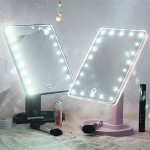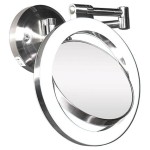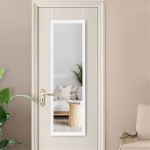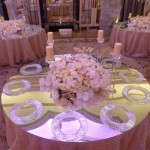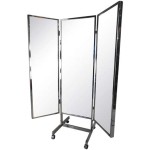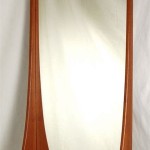Do Some Mirrors Make You Look Shorter?
The question of whether a mirror can distort one's perceived height is a common one. While a perfectly flat mirror should accurately reflect one's image, various factors can influence perception, leading to the illusion of appearing taller or shorter. These factors can be related to the mirror itself, the surrounding environment, or the observer's perception.
Mirror Quality and Distortion
The primary factor influencing how accurately a mirror reflects an image is its quality. High-quality mirrors are constructed from precisely flat, highly polished glass. This precision ensures minimal distortion of the reflected image. However, lower-quality mirrors, particularly inexpensive ones, may have imperfections in the glass surface. These imperfections, such as warping or unevenness, can create a distorted reflection, potentially making the viewer appear shorter, taller, or wider than they actually are. A simple way to test for distortion is to look at a straight line reflected in the mirror; any curvature in the reflected line indicates distortion.
The Impact of Mirror Placement and Angle
Even with a perfectly flat mirror, placement and angle can significantly affect the perceived reflection. A mirror tilted slightly downwards towards the viewer will make them appear shorter. This is because the angle of reflection changes the proportions of the reflected image, compressing the vertical axis and thus creating the illusion of reduced height. Conversely, a mirror tilted upwards will elongate the reflection, making the viewer appear taller.
The distance between the viewer and the mirror also plays a role. Standing very close to a mirror focuses the reflection on specific body parts, making it difficult to assess overall height accurately. Stepping further back provides a more comprehensive view, allowing for a more accurate perception of height. Additionally, the size of the mirror itself contributes to the overall perception. A smaller mirror may only reflect portions of the body, making it difficult to judge height accurately, while a larger, full-length mirror provides a complete view, enabling a more accurate assessment.
The Role of Lighting and Surroundings
The environment surrounding the mirror can also influence the perception of height. Lighting plays a crucial role; shadows cast by overhead lighting can create the illusion of shortened stature. Conversely, well-placed lighting that illuminates the entire body evenly can contribute to a more accurate perception of height. The surrounding decor, such as vertical stripes on wallpaper or tall furniture, can also create optical illusions that influence how one perceives their height in the mirror.
Perceptual Distortions and Psychological Factors
Beyond physical factors, psychological factors can also affect how individuals perceive their reflection. Body dysmorphia, a mental health condition involving a distorted perception of one's body image, can lead individuals to perceive themselves as shorter or taller than they actually are, regardless of the accuracy of the mirror's reflection. Similarly, pre-existing beliefs about one's height can influence perception. If an individual believes they are short, they may interpret their reflection as confirming this belief, even if the mirror is perfectly flat and properly placed.
Identifying a Distorting Mirror
Determining whether a mirror is distorting one's image requires a systematic approach. One effective method involves using a measuring tape to compare one's actual height to the perceived height in the reflection. Mark your height on a wall while standing straight against it. Then, observe your reflection in the mirror while positioned at the same distance from the mirror as the wall. If the reflection appears shorter or taller than the mark on the wall, the mirror is likely distorted. Alternatively, one can utilize a known straight object, such as a ruler or a piece of string, held against the body while looking in the mirror. Any curvature in the reflection of the straight object indicates distortion in the mirror.
The Importance of Accurate Reflections
Accurate self-perception is important for various reasons, from clothing choices to self-esteem. While minor distortions might seem inconsequential, they can contribute to an inaccurate body image. Therefore, ensuring access to mirrors that provide accurate reflections is essential, particularly in settings like clothing stores and homes. Professionals in fields requiring precise measurements, such as tailors and fitness trainers, rely on undistorted mirrors for accurate assessments.

Proof You Do Look Diffe In Every Changing Room Mirror Amanda Platell Writes Daily Mail

Why Do I Look Diffe In Mirrors 5 Common Reasons

Fuming Woman Accuses High Street Chain H M Of Using Curved Mirrors That Make Customers Look Fatter The Sun

Why Do I Look Diffe In Mirrors 5 Common Reasons
Why Do I Look Thinner In Some Mirrors And Bigger Others Quora

Why Do I Look Diffe In Mirrors 5 Common Reasons
Why Do We Look Fitter In Gym Mirrors Quora

Why Do Some Mirrors Make Me Look Skinnier Than Others Here S The Truth About Fat And Slim Sun

Here S How Fitting Room Mirrors Make You Look A Lot Better Than Do

Do You Look Shorter In A Mirror Glass N Mirrors

